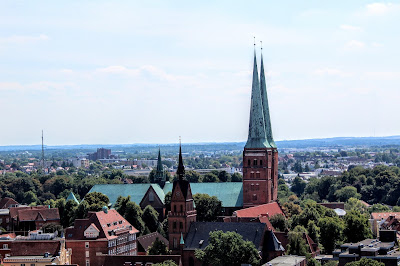During language camp we took Saturday trips to other cities near Hamburg. Our first excursion was on August 18, our first Saturday in Germany. We got up early and took a train to Lübeck a city 200,000 in Schleswig-Holstein, northern Germany. Lübeck was officially founded in 1143 and became the leading city of the ¨Hanseatic League,¨ a coalition of merchants and market towns that ruled the Baltic maritime trade for three hundred years along the coasts of Northern Europe (thanks wiki). The first impression of Lübeck is a lasting one. The western entrance to the altstadt is marked by an enormous town gate called the Holstentor.
 |
| ¨Field Side¨ |
 |
| ¨City Side¨ |
One thing that really stood out to me was the juxtaposition of the age and tradition of the city and the modern life of contemporary Lübeck. In the courtyard next to the Rathaus the city was setting up for the pride parade. Everything was draped in rainbow flags and several trucks were blaring club music which mixed oddly with the Piano and Trumpet 20 feet away (though it is important to note that neither group appeared to care - or even notice, that the other was there).
Our free hours in the city were a great deal of fun, I went to several churches, walked by a few rivers, browsed through a little bookshop, climbed a big tower overlooking the city, ate Marzipan (a Lübeck specialty) and took way to many photos of beautiful buildings and beautiful friends.




After leaving the city we went to a beach even farther north (so far north I could have hopped on a boat we saw leaving the harbor and sailed directly to Sweden). Although we couldn´t swim we spent a few beautiful hours by the water enjoying the sun and the classic German beach chairs (the beach chairs made me feel like an extra in a Wes Anderson film), before heading back to Hamburg and the hostel that was already beginning to feel like home.
The trip to Lübeck was a wonderful experience but it was also a wakeup call to the language learning process. I tried to use as much of my limited German as possible but failed several times. Someone tried to talk to me in the bookstore and I may have panicked and called a friend over for help. Later while getting food at the beach I tried to order for myself and for a friend, failed (even though ordering food is the easiest thing to do in a foreign language), didn´t notice, and then ended up sharing because we were running short on time. Lübeck was perhaps where I realized just how difficult certain aspects of this year are going to be, and how long a process learning a new language is.









No comments:
Post a Comment